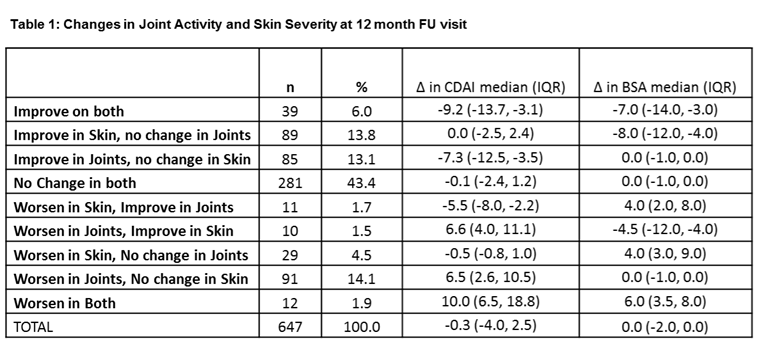Session Information
Date: Monday, November 6, 2017
Title: Spondyloarthropathies and Psoriatic Arthritis – Clinical Aspects and Treatment Poster II
Session Type: ACR Poster Session B
Session Time: 9:00AM-11:00AM
Background/Purpose: Treatment of both joint and skin symptoms is important for overall disease management of patients with psoriatic arthritis and comorbid psoriasis1,2. The objective of this study was to characterize treatment changes and the reasons in patients with comorbid PsA and PsO through 12 months of follow-up after enrollment into Corrona registry. Changes in joint/skin severity at the 12 month visit vs at enrollment were also evaluated.
Methods: Enrollment visit data from the Corrona PsA/SpA registry were obtained from 3/21/2013-9/30/2016 on patients with PsA diagnosed by a rheumatologist with a history of PsO. Patients were categorized into the following drug status groups: no change in therapy or change (reduction, addition or switch) in therapy. Reasons for discontinuation were categorized as: efficacy, safety, other, or unreported. Change in joint activity and skin severity from enrollment to 12 month visit were classified by change in category of CDAI, BSA or both. CDAI categories were as Low: ≤10, Moderate: 10<CDAI≤22, and High: >22. BSA was categorized as Low: ≤3%, Moderate: >3 to 10%, and High: >10%.
Results: 647 patients had CDAI, BSA, and known drug status. Majority (n=369, 57%) of patients had no changes in therapy. 278 patients had a change in therapy. Reasons for change were: no reason (70.9%, n=197), efficacy (10.4%; n=29); safety (5.8%; n=16), and other (12.9%; n=36). For patients whose joint or skin severity improved or worsened, the median change in BSA and CDAI scores was ≥ 4. Improvement in either joint or skin severity were seen in 135 (21%) and 138 (21%) patients, respectively. Worsening of either joint or skin severity were seen in 113 (18%) and 52 (8%) patients, respectively. No change in both joint and skin severity was seen in 281 (43%) patients. Patients with improvement in both joint and skin severity saw the greatest median reduction in CDAI and had the second largest median decrease in BSA, while those who worsened in both had the greatest median increase in CDAI and BSA scores (Table 1).
Conclusion: The majority of patients had no change in therapy and no change in either joint or skin severity after 12 months of follow-up. Patients with improvement in both joint and skin severity saw a large median reduction in CDAI and BSA while those who worsened had the greatest median increase in CDAI and BSA. Further study of the real-world impact of therapy changes on subsequent joint activity and skin severity is needed.
References:
1. Mease P, Mittal M, Joshi A, Chen N, Anderson J, Bao Y. Value of Treating Both Skin and Joint Manifestations of Psoriatic Arthritis: Post-Hoc Analysis of the ADEPT Clinical Trial. Ann Rheum Dis2015;74(Suppl2): 870
2. Mease P, Etzel C, Lisse J, Armstrong A, Huster W, Rebello S, Dodge R, Muram T, Al Sawah S, Murage M, Greenberg, J, Malatestinic W. The Relationship Between the Degree of Skin Involvement and Joint Activity in Patients with PsA: Experience from the Corrona Registry. Ann Rheum Dis 2017;76(Suppl 2): 1330
To cite this abstract in AMA style:
Mease PJ, Etzel CJ, Lisse J, Armstrong AW, Huster WJ, Rebello S, Dodge R, Muram TM, Al Sawah S, Murage MJ, Greenberg JD, Malatestinic W. Treatment Changes By Joint Activity and Skin Severity in Patients with Comorbid Psa and Pso [abstract]. Arthritis Rheumatol. 2017; 69 (suppl 10). https://acrabstracts.org/abstract/treatment-changes-by-joint-activity-and-skin-severity-in-patients-with-comorbid-psa-and-pso/. Accessed .« Back to 2017 ACR/ARHP Annual Meeting
ACR Meeting Abstracts - https://acrabstracts.org/abstract/treatment-changes-by-joint-activity-and-skin-severity-in-patients-with-comorbid-psa-and-pso/

